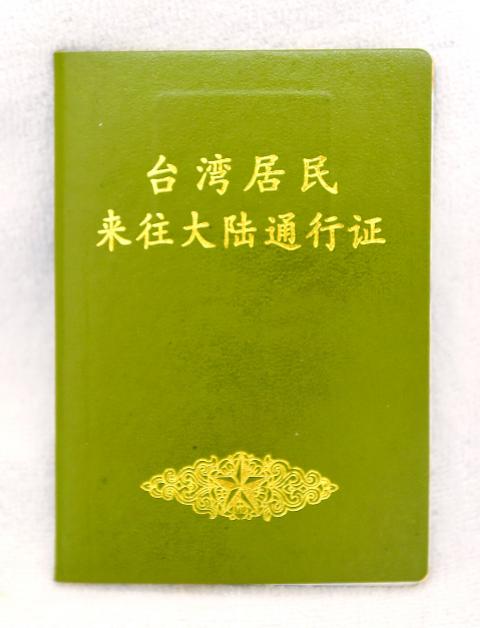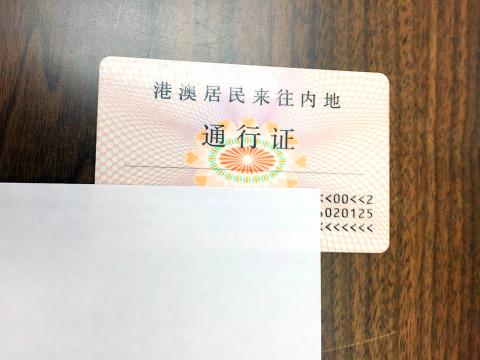Taiwanese travelers to China will no longer need to apply for an entry permit starting from July 1, China’s State Council announced yesterday.
The amendments to the “Measure for the Control of Chinese Citizens Traveling to or from the Region of Taiwan (中國公民往來台灣地區管理辦法)” state that Taiwanese can travel to China as long as they hold a valid Mainland Travel Permit for Taiwan Residents (台灣人民來往大陸通行證) — commonly referred to as a Taiwan compatriot permit (台胞證), China’s official Xinhua news agency reported.
China’s Taiwan Affairs Office (TAO) spokesperson Ma Xiaoguang (馬曉光) said that the changes were made to simplify application procedures for Taiwanese travelers.

Photo: Chang Chia-ming, Taipei Times
To apply for a Mainland Travel Permit, applicants only need to present their Taiwanese identification card and passport, as well as a filled-in application form and a photograph.
Currently, applicants have to provide documents stating their purpose of visit, the TAO said.
“We believe that the measure would further bring compatriots on both sides of the [Taiwan] Strait closer,” Ma said.

Photo: CNA
Cabinet spokesperson Sun Lih-chyun (孫立群) said that convenience of people-to-people interaction has always been a goal for both sides of the Taiwan Strait, and that Beijing’s announcement is helpful in enhancing cross-strait interaction.
Mainland Affairs Council (MAC) spokesperson Wu Mei-hung (吳美紅) said that Taiwan holds a positive view of the measure, but added that further observation is needed after the policy goes into effect next month to gauge its outcome.
The measure was announced after National Committee of the Chinese People’s Political Consultative Conference Chairman Yu Zhengsheng (俞正聲) said on Monday that the Mainland Travel Permit for Taiwan Residents would be replaced with IC cards allowing automatic entry.
Yu’s announcement has been panned by the Democratic Progressive Party (DPP) and Taiwan Solidarity Union as an attempt to treat Taiwanese like Hong Kong and Macau residents.
China’s Ministry of Public Security yesterday said it would start trials of the cards in certain locations this year.
Wu said the MAC is looking into who would be affected, the parameters of the trials and the functions of the digitized versions of the permit.
DPP spokesperson Cheng Yun-peng (鄭運鵬) said that there should be no political motivation attached to what appears to be the equivalent of a visa waiver, and called on the administration of President Ma Ying-jeou (馬英九) to be extremely careful on how Beijing implements the waiver due to its similarities with its treatment of residents in Hong Kong and Macau.
Additional reporting by Chen Hui-ping

US President Donald Trump yesterday announced sweeping "reciprocal tariffs" on US trading partners, including a 32 percent tax on goods from Taiwan that is set to take effect on Wednesday. At a Rose Garden event, Trump declared a 10 percent baseline tax on imports from all countries, with the White House saying it would take effect on Saturday. Countries with larger trade surpluses with the US would face higher duties beginning on Wednesday, including Taiwan (32 percent), China (34 percent), Japan (24 percent), South Korea (25 percent), Vietnam (46 percent) and Thailand (36 percent). Canada and Mexico, the two largest US trading

AIR SUPPORT: The Ministry of National Defense thanked the US for the delivery, adding that it was an indicator of the White House’s commitment to the Taiwan Relations Act Deputy Minister of National Defense Po Horng-huei (柏鴻輝) and Representative to the US Alexander Yui on Friday attended a delivery ceremony for the first of Taiwan’s long-awaited 66 F-16C/D Block 70 jets at a Lockheed Martin Corp factory in Greenville, South Carolina. “We are so proud to be the global home of the F-16 and to support Taiwan’s air defense capabilities,” US Representative William Timmons wrote on X, alongside a photograph of Taiwanese and US officials at the event. The F-16C/D Block 70 jets Taiwan ordered have the same capabilities as aircraft that had been upgraded to F-16Vs. The batch of Lockheed Martin

China's military today said it began joint army, navy and rocket force exercises around Taiwan to "serve as a stern warning and powerful deterrent against Taiwanese independence," calling President William Lai (賴清德) a "parasite." The exercises come after Lai called Beijing a "foreign hostile force" last month. More than 10 Chinese military ships approached close to Taiwan's 24 nautical mile (44.4km) contiguous zone this morning and Taiwan sent its own warships to respond, two senior Taiwanese officials said. Taiwan has not yet detected any live fire by the Chinese military so far, one of the officials said. The drills took place after US Secretary

CHIP EXCEPTION: An official said that an exception for Taiwanese semiconductors would have a limited effect, as most are packaged in third nations before being sold The Executive Yuan yesterday decried US President Donald Trump’s 32 percent tariff on Taiwanese goods announced hours earlier as “unfair,” saying it would lodge a representation with Washington. The Cabinet in a statement described the pledged US tariffs, expected to take effect on Wednesday next week, as “deeply unreasonable” and “highly regrettable.” Cabinet spokeswoman Michelle Lee (李慧芝) said that the government would “lodge a solemn representation” with the US Trade Representative and continue negotiating with Washington to “ensure the interests of our nation and industries.” Trump at a news conference in Washington on Wednesday announced a 10 percent baseline tariff on most goods